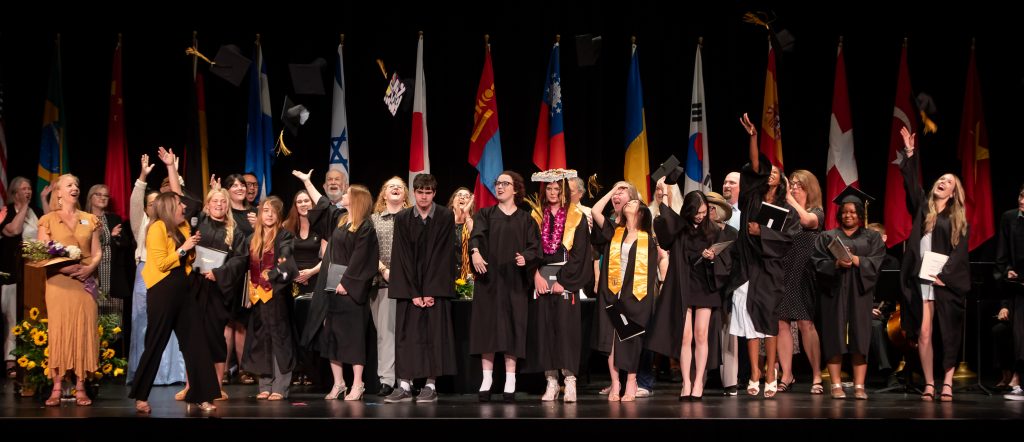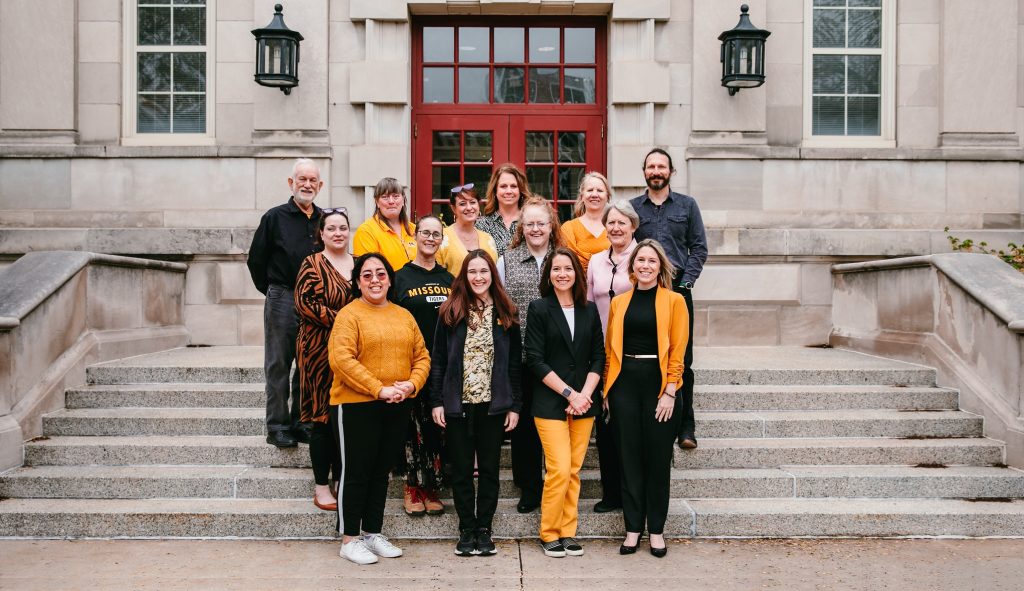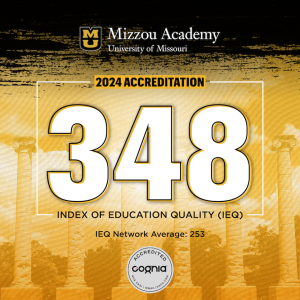Mizzou Academy Celebrates K-12 Accreditation Through Recognition by the Cognia Global Commission
Posted in: News
The Mizzou Academy team is proud to announce continued accreditation recognition by Cognia. “This accreditation cycle brought forth so many important school celebrations!” says Executive Director Dr. Kathryn Fishman-Weaver. “For one, this is the first time our lab school has been accredited as a full K-12 school system.” The school added elementary programming in 2020. Fishman-Weaver says that “offering excellent K-12 programming enables us to serve and grow with learners across the school-age continuum.”
Mizzou Academy earned continued Cognia Accreditation in April 2024. Cognia is a nonprofit organization that provides quality assurance for schools, school districts, and education service providers. Cognia, formerly AdvancED, recognizes districts that meet rigorous standards focused on productive learning environments, equitable resource allocation that meets the needs of learners, and effective leadership.
Cognia is the parent organization of the North Central Association Commission on Accreditation and School Improvement (NCA CASI), the Northwest Accreditation Commission (NWAC), and the Southern Association of Colleges and Schools Council on Accreditation and School Improvement (SACS CASI).
“As anyone who has been through the process can attest, accreditation can be daunting,” remarks Stephanie Walter, Director of Teaching and Learning. “How do you sum up the nuances of your school in a single report—even if it’s a large one?” The Mizzou Academy team amassed hundreds of pages of data, reports, and narratives. “How do you tell a school’s story in a way that not only conveys what we do and how we do it but also the experience and intention behind that story?”

A Team Approach
As we do with all major projects, Mizzou Academy took a team approach to the accreditation process. Throughout the 2023-2024 school year, the team spent dedicated time poring through school improvement data, processes, student stories, and impact statistics. They collaborated over Google Docs, in person, and on Zoom to have meaningful conversations about school processes, student work, leadership, and continued improvement. In addition to team voices, they also met with and surveyed students, families, and partners.
Fishman-Weaver says, “This process affirmed our commitment to excellence and illustrated how our core values of inclusion, innovation, access, and partnership guide our work.”
Walter continues by sharing that the Mizzou Academy “team is committed to student success, warmhearted and experienced, and dedicated to supporting each other. We take our work seriously and know how to have fun with each other. We encourage each other to grow and try new approaches even as we hope the same for our students.”
The two school leaders said that there is much to celebrate about Mizzou Academy, and they value the team’s growth mindset and asset-based approach to thinking critically about teaching, learning, student support, and impact.
Top Education Quality Index Ratings
Earning accreditation from the Cognia Global Accreditation Commission means that Mizzou Academy is recognized nationwide as a school that meets–or, in this case, exceeds–Cognia Performance Standards and is committed to continuous improvement.
After the review process, Cognia awards an Index of Education Quality (IEQ) as a holistic measure of overall performance. The top mark is a score above 300. The average IEQ is 252. Our IEQ is 348.

To earn Cognia accreditation, our K-12 school district must implement a continuous improvement process and submit it to internal and external review.
In a release on Mizzou Academy’s accreditation, Dr. Mark A. Elgart, president and CEO of Cognia, stated, “Cognia Accreditation is a rigorous process that focuses the entire school and its community on the primary goal of preparing lifelong learners in engaging environments where all students can flourish. Mizzou Academy is to be commended for demonstrating that it has met high standards and is making progress on key indicators that impact student learning.”
Points of Distinction
In the evaluative accreditation report, Dr. Nancy Bolz, Cognia’s Senior Director of the Midwest Region, wrote, “The academy sets high expectations and develops a love of learning and respect for diversity in a digital environment. Children from around the world benefit from the presence of the global community. The academy’s values of inclusion and access speak to students having equitable opportunities to realize their potential within this global presence.”
Mizzou Academy earned top marks on six accreditation standards. These standards were lauded for several noteworthy practices, including a culture of excellence, a commitment to action research, collaboration and guidance from the University of Missouri, student engagement, digital learning, and high expectations. Bolz called Mizzou Academy a “setting that respects their culture within this global community and stretches them in experiences that enhance confidence, creativity, curiosity, and design thinking through the 5E model and project-based learning.”
Mizzou Academy’s curriculum prioritizes the power of reflection. Walter shares that “this chance to pause” was one of her favorite parts of the process. “The opportunity to note what we’re doing now and sift through stories and data was priceless. Not only did this reflection period give us a chance to celebrate some essential and powerful things that have evolved during the last five years, but it also affirmed our future goals. The accreditation process made me even more excited to carry on the important work of our school—all with students, families, and partners at the center.”
In September 2024, Kathryn Fishman-Weaver and Stephanie Walter will represent Mizzou Academy at the annual Cognia Fall Conference, where the school will be recognized for these distinctions.
Stakeholders can learn more about the Cognia Accreditation at cognia.org.